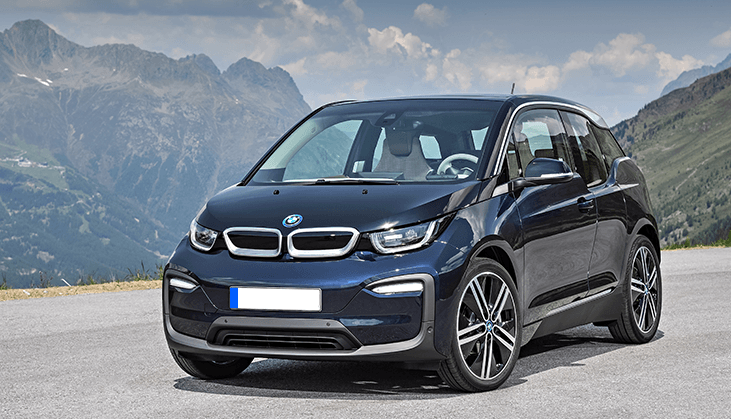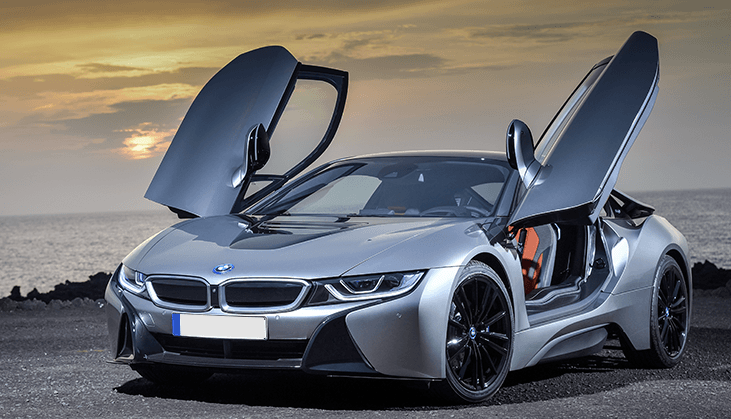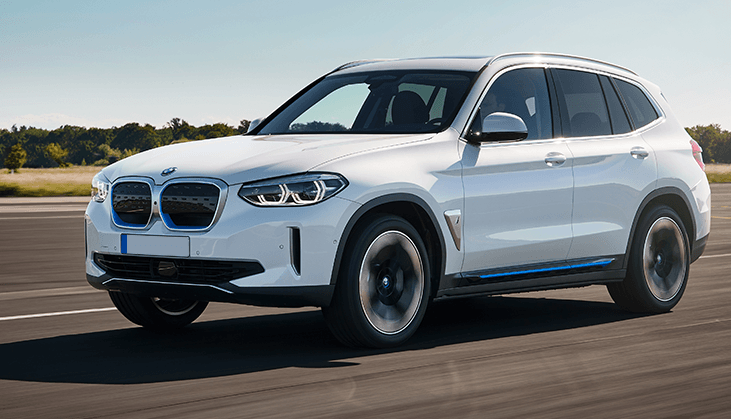The BMW electric car range isn’t as strong as some others at the moment, but the German manufacturer is working on changing that.
BMW themselves say they’re gearing up for a “fully-electric future”. And just in case you were in any doubt, it’s certainly the way day-to-day motoring is heading.
At this point, there’s only one fully-electric BMW on the market; the i3, although there are several other plug-in hybrid options available and more electric vehicles coming, but we’ll get on to those a little later.

So why the lack of choice? Especially given other, less prestigious brands already have a larger selection on offer.
Well, it’s all about timing, really.
Frankfurt Motor Show 2009
It wasn’t until 2009 that BMW announced their intentions of creating an all-electric car to the world. Funnily enough, it was also the same time Audi laid bare their plans, who find themselves in a similar situation with only one electric vehicle to their name and more in the pipeline.
So, by that logic, they’re about on track. BMW simply came later to the all-electric party than others. But that doesn’t mean they’re any less committed to a greener, cleaner future.
In fact, at the time of writing, BMW’s Munich construction plant is closed. It’s where they make the 3 Series and M3s. And it’s closed to prepare for the future.
By changing from petrol and diesel powertrains to hybrid and electric, significant alterations need to be made to the production line, and this shutdown is to implement those changes.
When it reopens in September 2020, work will then begin on the production of the all-new i4; BMW’s third all-electric vehicle, with the iX3 already on its way.
Planning For The Future
But the i4, which is on sale in 2021, is just one electric vehicle out of many planned by BMW.

In 2019, they made a 10-year, $10 billion deal – which is around £7.7 billion – with Chinese company CATL and Samsung as their battery supplier.
These cells will be used in the 25 all-electric vehicles BMW is planning to introduce in the coming years, which include electric versions of models already on the roads today, as well as new introductions into their range, such as the self-driving iNext.
BMW Electric Car Range
Although BMW plans to have more than 10 all-electric vehicles as part of their range by 2023, so far, they only have one – the BMW i3.
BMW i3
The i3 is BMW’s only battery-powered contribution to the world. Hatchback-sized and distinctive in style, the i3 comes in two forms; the original i3 and sportier i3s.
They’re both powered by the same synchronous electric motor with a single gear drawing from a lithium-ion high-voltage battery with a capacity of 94Ah (33kWh).

The green power source gives the original i3 170bhp, a range of 186 miles, a top speed of 93mph and a 0-62 time of 7.3 seconds. Meanwhile, the sportier s possesses an extra 14bhp, which may not sound a lot, but you can certainly feel the difference.
The s also comes with a different roof, bumpers, lower sports suspension and upgraded alloy wheels. On top of that, you also get Dynamic Traction Control, which, as well as a few other driving improvements, gives you the ability to drift the i3.
Body Styles
- Hatchback
Models
- i3
- i3s
Advantages Of i3
- Clean, spacious cabin
- No emissions
- Fast acceleration
- Fun to drive
Disadvantages Of i3
- Divisive styling
- Small boot
- Can be expensive
BMW Hybrid Car Range
Despite BMW’s all-electric range being small, there’s a much wider choice when it comes to hybrid alternatives.
Admittedly, however, most are plug-in hybrid versions of vehicles already on sale. Although there is one standalone model; the BMW i8 – even though it’s no longer in production.
BMW i8
The i8 is BMW’s answer to the hybrid sports car. With a small mid-mounted petrol engine producing 231bhp accompanied by an electric powertrain at the front churning out another 143bhp, the i8 tops out at an impressive 374bhp.
With the combination, you’re afforded three driving styles. An all-petrol drive, which will roughly match the performance of an M4, a combined drive, where you’re using the internal combustion engine and batteries in unison, and an all-electric drive, which will take you up to 75mph.

To improve performance and efficiency, the i8 is also delicately styled and comparatively light when considering other cars of this style and size. Aerodynamic focus and plenty of carbon fibre ensure you get the most out of your fuel reserves, whether that’s petrol or electric.
You can even enjoy this motoring experience without a roof thanks to the i8 Roadster. And despite a stiffer body and the addition of heavy roof mechanics, there’s very little to split the two in performance.
Body Styles
- Coupe
- Roadster
Models
- i8
- i8 Roadster
Advantages Of i8
- Distinctive styling
- Modern interior
- Excellent driving experience
- No emissions
- Fast acceleration
- Fun to drive
- Choice of driving styles
Disadvantages Of i8
- Poor visibility
- Slower than other petrol vehicles in its price range
- No longer in production
Other BMW Hybrid Cars
As mentioned earlier, several other BMW cars and SUVs have been converted into plug-in hybrids in the German company’s attempts to lower emissions.
These are the 2 Series, 3 Series, 5 Series and 7 Series, as well as the X1, X3 and X5. They’re all part of BMW’s iPerformance project, and you can read about them by clicking these words.
Software & Technology
BMW eDrive
eDrive is the system used by BMW in its fully-electric and plug-in hybrid vehicles. It consists of three components; the electric motor, lithium-ion high-performance batteries and an intelligent energy management system.
The first two are fairly self-explanatory, but the energy management system is how BMW ensures its vehicles are as efficient as possible.
As every mile counts when it comes to electric and hybrid cars, the system ensures it eeks every available drop of electricity out of its batteries in the most effective way possible – giving the driver more miles from a single charge.
Life-Drive
Life-Drive was first seen on the BMW i3 and it also features on the i8. It’s a platform which allows BMW to make use of light-weight materials in the production of their cars.
What it means is both the i3 and i8 come with aluminium chassis, carbon fibre reinforced plastic bodywork is used on the i3 – the first of its kind – and in the case of the i8, lighter polycarbonate glass features.
Autonomous Driving
Many manufacturers have tried to create their own autonomous driving systems and failed. There’s the famous video of the self-driving Volvo crashing into the rear of a truck during a press testing day. Not a good look.
But BMW is still persistent. And for a while, they partnered with Mercedes-Benz in the pursuit of producing a reliable, autonomous system.
That partnership has since been put on hold, but they both continue to develop their own technology, with BMW now searching for partners outside of the automotive sector.
That hasn’t slowed the Bavarian manufacturer’s plans for the iNext, however, and that seems a good place to start when it comes to BMW’s concept vehicles.
BMW Concept Electric Cars
BMW names its future vehicles concepts. Because until they roll off the production line and into showrooms, that’s what they are.
But all of BMW’s current vehicles on sale today were once concepts, and if their track record is anything to go by, there are some exciting new cars to come out of Germany in the next few years.
BMW iNext
The BMW iNext is a fully-electric, heavily automated and fully connected SUV. It’s scheduled for production in 2021 with one significant aim, to take the company into the next chapter of its life with a vehicle that’s as comfortable and welcoming as your own home.
Designs suggest it’ll be an open, airy minimalist cabin with no door pillars providing an almost 360-degree view of the world around you.
BMW i4
However, one new electric car that’s definitely coming is the all-new i4. It takes its exterior design from the new 4 Series, although on the inside a large digital display is the main point of reference.
It’ll hit roads in 2021 and come with a reported 372 miles of range.
BMW iX3
And if you’re excited about the prospect of an all-electric BMW coming soon, you don’t even have to wait until 2021, as the iX3 is scheduled for release in September 2020 – 2021 in the UK.

Based on the design of the current BMW X3, it’ll be the first model to feature the fifth generation of BMW’s eDrive system and cover 270 miles on a full charge.
Read More About Electric Vehicles
Hippo Guide To The Audi Electric & Hybrid Car Range
 Special Offers
Special Offers

 24th August 2020
24th August 2020  8 min read
8 min read 